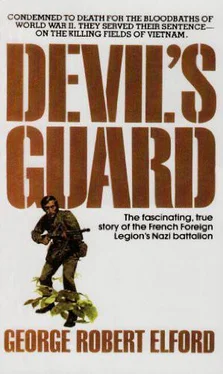Frantically the Viet Minh High Command was trying to suppress our activities in their vital staging areas, hitherto safe from French harassment. Giap concentrated over a thousand guerrillas in an all-out attempt to destroy us, but the more troops he concentrated, the less he could preserve the secrecy of their whereabouts. General Giap found us a hard nut to crack. We were too strong for Viet Minh units of company strength and could in fact easily outgun any guerrilla battalion. The enemy needed at least a brigade to tackle my headhunters. A brigade, however, cannot play hide-and-seek in the jungle. Units consisting of over three thousand men need ample supplies; besides they also make a great deal of noise. Whenever the enemy appeared to be concentrating several battalions in a particular area we either delivered a preemptive strike to grind them up piecemeal or we slipped quietly away towards safer hunting grounds.
The loss of one guerrilla camp must have been particularly painful for the Viet Minh. In it we discovered twelve fully equipped workshops for servicing weapons, manufacturing mines, spear guns (the terrorists were still extensively using this brutal weapon), sandals, bombs. A printing shop and a dressing station were also among the camp facilities. Lathe benches, grinders, power drills and other machines were in the workshops. The power came from five small diesel generators placed in a long underground tunnel to deaden sound. Some of the machines weighed over a ton and had obviously come dismantled from one of the principal cities.
The battalion killed over a hundred guerrillas and captured thirty or forty of them in that camp. The majority of the casualties were irreplaceable specialists: machine tool operators, electricians, weapons makers, five engineers, six printers, two pharmacists, and two doctors.
Among the prisoners were six Lao Dong functionaries, including a district secretary and a district Agitprop secretary.
The camp was a marvel of guerrilla ingenuity. The overhead camouflage netting was covered with natural green that matched the surrounding flora. To keep the foliage fresh it had to be replaced every other day, and for that purpose the various sections of the netting could be lowered or raised. Where air reconnaissance observed only unbroken forests, in reality a spacious clearing spread for hundreds of yards, with permanent huts, living quarters, water tanks, mess halls, depots, and workshops.
Strolling about the camp with Schulze I spotted Xuey, who was closely inspecting a section of ground where I saw piles of bamboo spokes neatly arranged under a tarpaulin sheet.
“Anything wrong?” I tapped him lightly on the shoulder.
He looked up and nodded. “Plenty wrong! There were French prisoners working here, sharpening stakes. Dead or alive they should be somewhere around.”
“Prisoners?” Schulze exclaimed incredulously. “We searched the whole camp, Xuey—”
“Look at the footprints,” Xuey said. He squatted on his heels and drew a finger around the contours of a bare print. “It was made by a very large foot… No local people have feet as large as this one.”
A glance at the print was enough to convince me that Xuey was right. “But where on earth could they be?” Erich pondered.
“Somewhere in the woods, maybe underground,” Xuey suggested. “We should start looking for them or they may die.”
I called for Sergeant Krebitz and he came running. I told him of Xuey’s discovery. “Get a hundred men and comb the neighborhood. Don’t destroy anything, unless the place has been searched with the utmost care.”
The troops surveyed the entire area and combed the woods for five hundred yards but all in vain. There was a trail which Xuey and Krebitz went to investigate as far as a mile and a half, but it ended in a rocky depression among barren hills strewn with boulders and dead trees.
The depression seemed to have several exits and it would have taken days to examine them all.
The surveying parties found neither prisoners nor caves and tunnels where prisoners could have been kept confined. I spoke once again with Xuey. “Are you sure that those prints were recent ones?” I asked him.
He looked at me and asked in turn, “Have I ever erred in my judgment, Commander?”
“Not that I know of, Xuey,” I had to concede.
He nodded contentedly. “I am not mistaken now!”
“But where can they be? They aren’t in the camp and if there was another place nearby, we ought to find a path leading to it.”
“I was looking for a path,” Xuey said. “Sometimes they are very difficult to detect. Often the Viet Minh make no paths at all but use different routes between two bases every day, allowing the grass to recover. Such trails cannot be detected. Only the people who use them know their location.”
“What do you suggest we should do?”
“Question the prisoners!” Xuey replied.
There was nothing else I could do. If Xuey was right about the French prisoners, they had to be helped at once.
“Sergeant Schenk!” I turned sharply. “Where are the captured guerrillas?” He swung the barrel of his submachine gun toward a long, thatched hut. “Over there, Commander!”
“Bring them here!” Eisner and Riedl appeared. “What’s going on?” Bernard inquired. I briefed him on the situation and his face darkened. “Then I am afraid they are dead,” he remarked grimly. “If any French prisoners had been here, they must have heard us moving around. They would be screaming their heads off by now for help.”
“They might be underground.”
Sergeant Schenk returned with the prisoners and lined them up facing us. Without preliminaries, Sergeant Kre-bitz grabbed the district secretary by the shoulder.
“Where are the French prisoners, ratface?” he sneered at the slim, pockmarked terrorist. “Open your goddamned mouth or I’ll break every bone in your wretched carcass.”
“We have no French prisoners,” came the defiant reply.
“You are a liar!” Xuey cut in, stepping closer. “I saw their footprints.”
“You are a filthy traitor,” the propagandist hissed and spat toward Xuey. “We will get you one day, you colonialist puppet—Gia Xuey… We know you well.”
“Indeed?” Eisner stepped in front of the prisoner, drew his bayonet and held it against the man’s belly. “Do you happen to know me as well?”
“We know you all and we will get you, too, one day.”
“You will get us, too, eh? Whom have you already gotten?” He paused for a moment, then repeated his question in a low, menacing tone, “Where are the French prisoners?” Silence and a defiant, sardonic smile were all he got as an answer. With a sudden, powerful thrust, Bernard plunged the blade home. .The propagandist uttered a bubbling moan, his mouth opened, and his face contorted in pain; with a low, animal grunt he sagged toward Eisner. Bernard pulled his bayonet free and let the man drop.
“I am not a man of jokes,” he sneered at the dying terrorist. Stepping up to the party secretary he repeated his question.
“You may kill us all, you Fascist dogs,” the guerrilla breathed with hatred oozing from his lips. “Kill us all, and you may also forget about your Legionnaires for you will never find them.”
He uttered a short, hysterical snort. “They will rot away alive!”
“That’s what you think, cher ami,” Bernard grinned. “But you are going to tell us where they are. We will find them all right.”
He lifted the still dripping bayonet.
The party secretary paled but gathered himself and cried, “Go ahead and stab me, too!” But Eisner only smiled at him with narrowed eyes. He wiped the blade on the prisoner’s pajama and sheathed it.
“Your death is not going to be so easy,” he said quietly. “When I am through with you, you will be praying for death to come.”
Читать дальше












